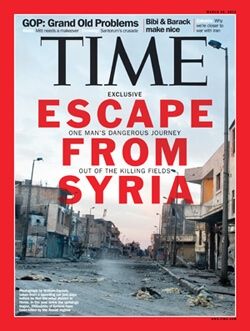Iranian Atomic Urgency
• What steps would Iran have to take for Israel to back off from attacking? According to the Sunday Times of London (paywall):
Netanyahu is said to have set three conditions the Iranians must fulfil to stave off an Israeli raid: to transfer to a third party the 150kg of uranium they have enriched; to cease enrichment at the Fordow site near Qom; and to halt any further enrichment beyond the 3.5% required for power generation.
• Columnist Philip Stephens (Financial Times, click via Google News) tut-tuts his disappointment at Israel for making its concerns about a nuclear Iran a US presidential campaign issue. If only the rest of the world would disappear so that voters could choose the best candidate without the distractions of international politics . . .
• Ex-Mossad chief Meir Dagan to 60 Minutes: Iran is rational; don’t attack now.
• The White House denies Israeli media reports that Obama and Netanyahu made a deal to delay an attack on Iran in exchange for weapons.
• NY Times public editor Arthur Brisbane wonders about the balance in the Gray Lady’s coverage of Israeli-Iranian tensions.
Getting the Iranian point of view, though, has proved far more elusive and is complicated by The Times’s difficulty gaining access to the country, which carefully controls foreign news media. Although The Times’s Robert F. Worth captured some Iranian voices in his Feb. 6 article on the impact of sanctions, The Times has not been able to report from within the country on a consistent basis.
The result is an asymmetry of perspective, something I heard frequently in conversations with others about the coverage . . . .
What is needed from The Times, he added, is more effort not only to get ordinary Iranian voices into the coverage but also to reach across the cultural divide to fully understand significant statements from the Iranian leadership, like the fatwa against nuclear weapons by Ayatollah Ali Khamenei, the supreme leader.
I share this view and believe the West’s inability to understand the other side’s leadership may have a parallel with the run-up to the Iraq war.
• For more commentary/analysis, see Charles Krauthammer, Frida Ghitis, George Jahn, David Ignatius, and, on the other side of the spectrum, Peter Beaumont and The New Statesman.
Arab Spring Winter
 • Safely out of Syria, photographer William Daniels is rightly concerned that the Western journalists killed and injured in Homs will overshadow the suffering of ordinary Syrians. He told Time:
• Safely out of Syria, photographer William Daniels is rightly concerned that the Western journalists killed and injured in Homs will overshadow the suffering of ordinary Syrians. He told Time:
Above all, Daniels remains most troubled that the ghastly suffering they witnessed might be getting lost amid the story of six western journalists. He says he feels deeply uncomfortable that their ordeal has gripped world attention while hundreds of Homs residents had been killed in the four-week siege. The people they’d left behind could well have been slaughtered by the advancing Syrian Army. Each person Daniels met in Bab Amr had lost loved ones — their unremembered names joining the close to 8,000 people who have died so far in the conflict in Syria. And while the people of Bab Amr treated the journalists with extraordinary care, Daniels and Espinosa had seen 150 locals huddling in a single basement, with minimal food and water, struggling to survive the siege. “The real story is not us, it’s the Syrian people,” Daniels says. “You must write that. What we experienced was 10% of what these people experienced in Bab Amr.” They might never know what retribution those who cared for them in Bab Amr or helped them out of Syria, might suffer. As for the Syrian activists who died in the chaotic process of rescuing the western journalists, no one is likely to know their names for a long time. The very revelation of their identities is likely to put their loved ones who remain in Syria at risk.
• Rebel groups tell Reuters that four Syrian generals have defected.
• UNESCO panel does not remove Syria from human rights committee
Rest O’ the Roundup
 • James Taranto makes an astute observation about the NY Times:
• James Taranto makes an astute observation about the NY Times:
Two Papers in One!
- “Israel’s reputation as a vibrant democracy has been seriously tarnished by a new law. . . . The law, approved in a 47-to-38 vote by Parliament, effectively bans any public call for a boycott–economic, cultural or academic–against Israel or its West Bank settlements, making such action a punishable offense. . . . Nonprofit groups could lose tax benefits.”–editorial, New York Times, July 18, 2011
- “Taxpayers should be encouraged by complaints from Tea Party chapters applying for nonprofit tax status at being asked by the Internal Revenue Service to prove they are ‘social welfare’ organizations and not the political activists they so obviously are. Tea Party supporters claim they are being politically harassed with extensive I.R.S. questionnaires. But the service properly contends that it must ensure that these groups are ‘primarily’ engaged in social welfare, not political campaigning, to merit tax exemption under section 501(c)(4) of the tax code.”–editorial, New York Times, March 8, 2012
• Haaretz on the UN’s latest bash Israel idiocy:
The United Nations’ Commission on the Status of Women (CSW), scheduled to wrap up its annual session on Friday, is expected to pass a resolution condemning Israel’s part in the degrading of living conditions for Palestinian women, while failing to mention the mistreatment of women in the ongoing crisis in Syria.

• Israel’s building a detention center in Negev for illegal African migrants and their families. The Independent writes:
Human rights groups fear that the detention centre, the largest of its kind in the world, with a capacity to hold 8,000 migrants, will turn into a festering refugee camp, and deprive those escaping persecution at home of their rights to seek asylum in Israel.
• UK’s Press Complaints Commission is closing, to be replaced by a transitional body. When the dust settles on the Levenson Inquiry into the phone-hacking scandal, a new system will be established. The BBC also announced that it will launch an online clarifications and corrections page to improve its complaints procedure. Details at The Guardian and UK Journalism.
(Image of Iron Dome via Flickr/Israel Defense Forces)
For more, see Thursday’s Israel Daily News Stream.
Clicking “Unsubscribe instantly” on your mailing will remove you from the Israel Daily News Stream list, but not from your regular HonestReporting emails.

